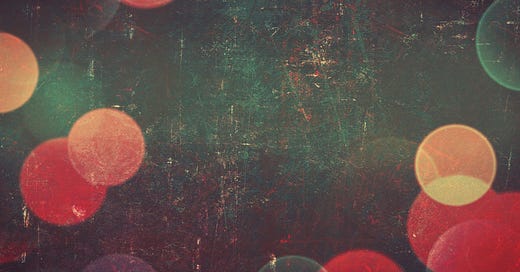in the beginning there was the word —
in the end, only images
a perversion of the symbols and pictures
and insights that changed us
from apes to slightly more intelligent apes,
a parade of show-and-tell
where our dreams become hollow obsessions
— she left the man
whose words had the power to heal
to chase the boy who stole scenes…
they wandered together down open roads
with the world on the brink of destruction,
traversed desert plains, rode on bullet trains,
and soared in flying machines
to arrive at a sacred place, a holy space
reminiscent of everyone’s origin story…
you can use your inventions
to bring vision to the blind, but the sightless
have already figured out how to see —
their view of the world and life itself
can’t even compare to our stereoscopic distortions
— there’s a wondrous paradise, a vista nestled
in a personal pitch that functioning eyes
can’t even begin to understand…
why bring the curse of light-based representation?
this cheap, photo-realized truth means nothing
to a mind that has already created its own magic —
in what we think of as absence is the fullness of
subconscious thought…
suck your own dreams right out of your own
REM-deprived heads and sizzle them
in the frying pan of modern mixed media,
but leave the rest of us with our words,
leave us with our ambiguous hopes,
and our undying songs, and may
the prayers on our tongues help
those who are lost
find their way home in the darkness
Garbage Notes:
The poem was inspired by the Wim Wenders film Until the End of the World, which, in my opinion, is one of the most underrated science fiction films ever.
I think a powerful theme in that movie is the idea of visual imagery and digital media supplanting text-based media.
The first line of this piece is a reference to a voiceover by the narrator who discusses how there’s something about “the word” that is more pure, whereas “the image” has a greater tendency to corrupt.
My poem here hits on some of the plot beats and what the story’s about. The movie centers around a controversial piece of technology that enables blind people to view the moving images that sighted people have seen. The device can essentially record visual experience in the brain and can even record dreams. It can then play back this imagery to the viewer.
Unfortunately the protagonists become obsessed with the device, getting so lost and so self-absorbed in the nature of their own visual dream imagery that they end up becoming hollow shells of their former selves.
Does this sound familiar? Our culture is certainly toxically self-absorbed. We are obsessed with documenting and recording ourselves, our everyday lives, in very intimate detail. We destroy ourselves with the need for self-gratification in the form of sharing this visual content with the world. But is this the highest evolution of human communication?
There was a time when our primary avenue for sharing the contents of our minds was through poetry and song and stories around the campfire. Through parables and sacred texts. And now it’s done via a constant barrage of ad-based visual vignettes intended to stimulate the dopamine centers of the watchers as much as it gratifies the creator’s own narcissistic tendencies.
So, back to the core question—has shared digital imagery become a perversion of human interaction? I don’t know. It has to be acknowledged that modern human communication is very much a hybrid of word-based and image-based stimulation. And we know language itself evolved as much from simple sounds and gestures as it did from crude pictures and symbols on cave walls. So both types of media, verbal and visual, come very natural to us.
You can’t deny, though, that there is something instinctual and immediate to the use of visual imagery. It’s why short TikTok videos now dominate the attention streams of people across the world. It’s why Youtube creators are the new university professors. It’s why people find it easier to read graphic novels than epic novels. It’s why our brains sometimes find it easier to stream hundreds of hours of television than read a tiny short story.
So I’m left with the last line of the poem: “may the prayers on our tongues help those who are lost…may we all find our home in the darkness.” Regardless of what kind of media we consume, we have the need to connect. We are human beings—we are the loneliest social animal. And we all go to bed at night and face the same darkness.
Ultimately the mind will process and create its own reality—whether it’s from verbal or visual input. Either way, it’s always fascinating to think about. And it’s never a dull venture to contemplate the nature of dreams and the evolution of human expression.
So anyway, if you can and are interested in this film, definitely get your hands on the Criterion Collection version of it. It’s the full 4-hour long cut that captures the complete vision of Wim Wenders. It’s a thought-provoking epic and one that was surprisingly ahead of its time for the early 90s in terms of predicting the landscape of how we would ultimately go on to use our devices to connect with one another across the world.
Franco Amati 2023





I so appreciate your reflections/revelations in this poem and essay. I’m torn with the visual. On one hand it offers my subconscious a way to communicate through symbol, composition, color... but on the other, my eyes are the laziest of my senses. They inform but often misinterpret and fail to truly understand.
"Suck your own dreams
Right out of your own
REM deprived heads." Ahhhh the chilling thrill of poetic trash talking. Worthy of Cyrano de Bergerac.